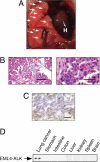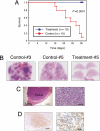A mouse model for EML4-ALK-positive lung cancer
- PMID: 19064915
- PMCID: PMC2605003
- DOI: 10.1073/pnas.0805381105
A mouse model for EML4-ALK-positive lung cancer
Abstract
EML4-ALK is a fusion-type protein tyrosine kinase that is generated in human non-small-cell lung cancer (NSCLC) as a result of a recurrent chromosome inversion, inv (2)(p21p23). Although mouse 3T3 fibroblasts expressing human EML4-ALK form transformed foci in culture and s.c. tumors in nude mice, it has remained unclear whether this fusion protein plays an essential role in the carcinogenesis of NSCLC. To address this issue, we have now established transgenic mouse lines that express EML4-ALK specifically in lung alveolar epithelial cells. All of the transgenic mice examined developed hundreds of adenocarcinoma nodules in both lungs within a few weeks after birth, confirming the potent oncogenic activity of the fusion kinase. Although such tumors underwent progressive enlargement in control animals, oral administration of a small-molecule inhibitor of the kinase activity of ALK resulted in their rapid disappearance. Similarly, whereas i.v. injection of 3T3 cells expressing EML4-ALK induced lethal respiratory failure in recipient nude mice, administration of the ALK inhibitor effectively cleared the tumor burden and improved the survival of such animals. These data together reinforce the pivotal role of EML4-ALK in the pathogenesis of NSCLC in humans, and they provide experimental support for the treatment of this intractable cancer with ALK inhibitors.
Conflict of interest statement
Conflict of interest statement: K.T. is a consultant for Dako.
Figures




References
-
- Schiller JH, et al. Comparison of four chemotherapy regimens for advanced non-small-cell lung cancer. N Engl J Med. 2002;346:92–98. - PubMed
-
- Paez JG, et al. EGFR mutations in lung cancer: Correlation with clinical response to gefitinib therapy. Science. 2004;304:1497–1500. - PubMed
-
- Shigematsu H, et al. Clinical and biological features associated with epidermal growth factor receptor gene mutations in lung cancers. J Natl Cancer Inst. 2005;97:339–346. - PubMed
-
- Li D, et al. Bronchial and peripheral murine lung carcinomas induced by T790M-L858R mutant EGFR respond to HKI-272 and rapamycin combination therapy. Cancer Cell. 2007;12:81–93. - PubMed
Publication types
MeSH terms
Substances
LinkOut - more resources
Full Text Sources
Other Literature Sources
Medical
Molecular Biology Databases

